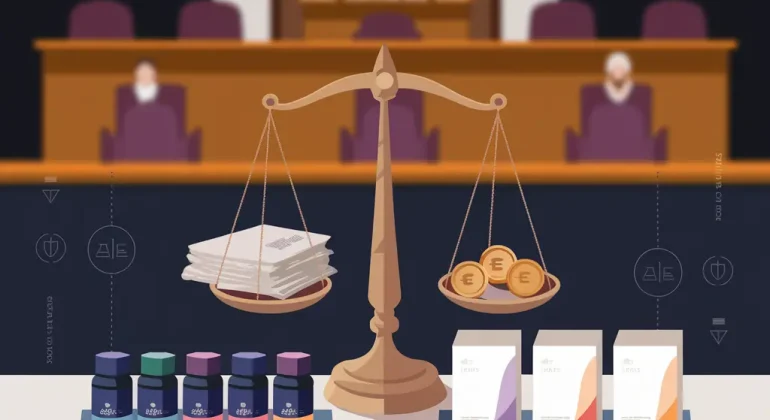Precedent on Opposition and Cancellation Proceedings – 2024
In the dynamic landscape of intellectual property law, opposition and cancellation proceedings serve as vital instruments for ensuring trademark registries maintain integrity and relevance. In 2024, the INPI (Institut National de la Propriété Industrielle) and French courts delivered landmark decisions that clarified procedural subtleties and substantive grounds for action. This article explores key decisions, offering practitioners and businesses critical insights into the latest trends shaping French IP litigation.
Key Procedural Elements in Cancellation and Opposition
Non-use Cancellation and Evidence Requirements
Cancellation for non-use remains a critical aspect of trademark disputes. Recent decisions reflect the broad evidentiary approach adopted by the INPI. Undated documents such as marketing materials and screenshots, when evaluated collectively with dated items, have been deemed admissible (e.g., INPI, 2 May 2024, Bob dépannage!). This leniency underscores the need for comprehensive and detailed records of use.
However, the geographical scope of use remains tightly interpreted. For instance, evidence targeting a non-French market (Swiss company) in English were deemed insufficient to establish French usage (INPI, 11 March 2024, Bureau d’Idées), reminding trademark holders of the importance of local relevance.
Procedural Standing and Abuse of Rights
A consistent theme in 2024 decisions is the public interest nature of cancellation proceedings, obviating the need for claimants to demonstrate personal interest. This principle highlights the role of such proceedings in ensuring the integrity of trademark registries and was reaffirmed in CA Paris, 24 April 2024, Vape, which emphasized the role of these actions in cleansing the registry.
Claims of abuse of rights require substantial evidence of malicious intent. In MySunbed (INPI, 27 May 2024), the INPI rejected bad faith allegations where the claimant’s actions were not clearly aimed at harming the trademark holder, setting a high bar for abuse-related defenses.
Temporal Scope and Legal Framework
The temporal application of law remains pivotal in cancellation actions. Decisions such as Cavalride (INPI, 3 April 2024) reiterated that trademarks are assessed based on the legal framework at their filing date, making historical legal research an indispensable tool for practitioners.
Grounds for Cancellation: Absolute and Relative
Distinctiveness, Deceptiveness, and Public Order
Distinctiveness remains a cornerstone of trademark registrability. The MySunbed case (27 May 2024) highlighted the evolving standards of consumer perception, particularly concerning basic English terms used in France (INPI, 27 May 2024). Meanwhile, decisions on deceptiveness emphasized the need for claimants to demonstrate misleading potential at the time of filing, rather than relying on post-registration evidence (INPI, 3 April 2024, NL 22-0199).
Public order considerations were addressed in cases like NL 23-0089, where the INPI dismissed claims that a trademark contravened legal restrictions, focusing on whether actual prohibitions existed at the time of filing (INPI, 18 March 2024).
Renown and Parasitic Intentions
Proving renown remains challenging, as it requires robust evidence such as prior judicial recognition or extensive consumer exposure (INPI, 12 July 2024, Immo Angels). Meanwhile, allegations of parasitic intent require clear links between the litgious trademark and a recognizable external reference, as demonstrated in the Cadault case (INPI, 29 April 2024).
Case Law Insights: Trends in French IP Litigation
French IP precedent in 2024 reveals a pro-business tilt, particularly in its evidentiary flexibility for proving use. However, the INPI’s stringent standards for distinctiveness and renown ensure that frivolous registrations face robust scrutiny. This balanced approach promotes a competitive yet fair trademark ecosystem.
Additionally, courts have shown increasing sophistication in addressing linguistic and cultural nuances. The La Chicha Loca case, for instance, highlighted the growing recognition of diverse public perceptions based on regional language comprehension (INPI, 26 January 2024).
Conclusion & Takeaway
The decisions of 2024 underscore the importance of strategic preparation in opposition and cancellation proceedings. Practitioners must anticipate evidentiary hurdles, leverage historical legal contexts, and adapt arguments to evolving standards of distinctiveness and public perception. Key takeaways include:
- The INPI increasingly emphasizes public interest in cancellation actions.
- Successful cancellation claims demand comprehensive, evidence-backed arguments, particularly regarding distinctiveness and renown.
- Cultural and linguistic contexts play a growing role in trademark disputes.
At Dreyfus Law Firm, we are uniquely equipped to guide clients through the complexities of trademark disputes, leveraging our expertise and a global network of IP specialists. Whether navigating opposition, cancellation, or broader trademark strategy, we ensure robust protection for your intellectual property assets.
Connect with Dreyfus Law Firm on social media or subscribe to our newsletter to stay informed on the latest in IP law. Let us be your partner in safeguarding your brand worldwide.
Dreyfus Law Firm is partnered with a global network of lawyers specializing in Intellectual Property.
Join us on social media!



